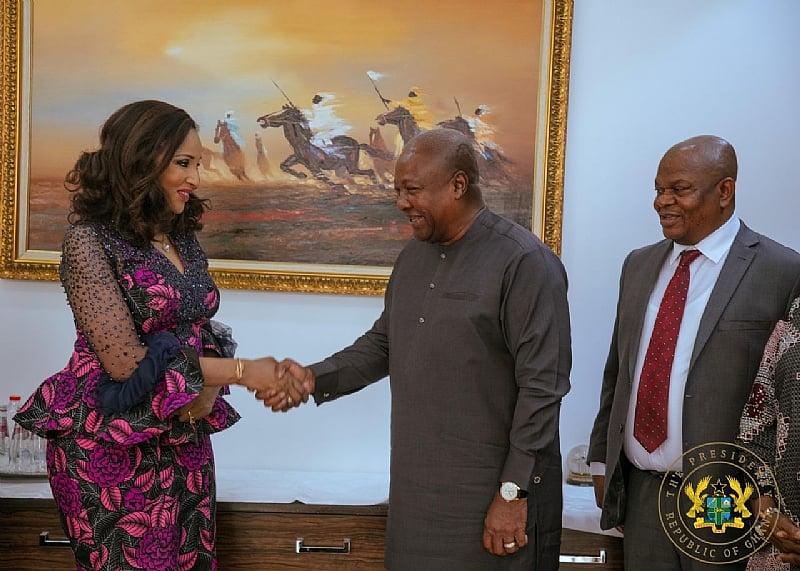The recent diplomatic engagement between Ghana and Nigeria underscores the complexities and sensitivities surrounding migration, regional integration, and the power of misinformation in the digital age. Triggered by a resurgent video from 2013 featuring an individual claiming to be an Igbo king and discussing land acquisition in Ghana for a purported kingdom, the incident quickly escalated, fueling anxieties in Nigeria and prompting concerns about potential mass deportations of Nigerian nationals from Ghana. President John Dramani Mahama of Ghana moved swiftly to address the situation, hosting a high-level Nigerian delegation led by Minister of State for Foreign Affairs, Bianca Odumegwu-Ojukwu, and offering unequivocal assurances that no such action was planned. He characterized the incident as a “storm in a teacup,” attributing the heightened tensions to the rapid spread of misinformation and the misinterpretation of the video’s content. President Mahama emphasized that Ghanaian law prohibits the establishment of foreign traditional councils, effectively debunking the claims made in the video.
The meeting served as a crucial platform for reaffirming the deep-rooted historical ties between Ghana and Nigeria. President Mahama underscored the shared destiny of the two nations, highlighting their membership in the Economic Community of West African States (ECOWAS) and the protocol that guarantees free movement of citizens within the region. He invoked the shared parentage metaphor, emphasizing the familial bond between the two countries and advocating for a future grounded in mutual respect and understanding. This emphasis on shared history served to contextualize the incident within the broader narrative of West African integration, positioning the recent tensions as an aberration rather than a reflection of the true state of relations. By acknowledging the painful legacy of past deportations, both from Nigeria in the 1980s and from Ghana in the 1960s, President Mahama framed the current situation as a critical opportunity to learn from past mistakes and to prevent the recurrence of such divisive actions.
The Ghanaian president’s approach was characterized by a blend of reassurance and firmness. He categorically dismissed any notion of collective punishment against Nigerian nationals residing in Ghana. While acknowledging the occurrence of isolated criminal incidents involving foreign nationals, he emphasized that such cases would be handled in accordance with the law, ensuring individual accountability and due process. This commitment to the rule of law served to dispel fears of arbitrary actions and reinforced the message that Ghana remained a welcoming environment for law-abiding foreign residents. By separating the actions of individuals from the broader Nigerian community in Ghana, President Mahama effectively de-escalated the situation and prevented the incident from spiraling into a diplomatic crisis.
Minister Odumegwu-Ojukwu, representing President Bola Ahmed Tinubu of Nigeria, conveyed the anxieties gripping the Nigerian populace following the viral video. She highlighted the emergency discussions held within the Nigerian National Assembly and the widespread public fear that had taken hold. Her account underscored the speed and intensity with which misinformation can spread in the digital age, highlighting the potential for such incidents to escalate quickly and create real-world consequences. The minister’s remarks also revealed the deep-seated concerns within Nigerian society, with some traditional leaders even urging their people to return from Ghana. This underscores the potential for such incidents to trigger internal displacement and disrupt the lives of ordinary citizens. The mention of fears surrounding potential targeting of Nigerian-owned businesses in Ghana further illustrated the economic dimension of the crisis and the potential for significant disruption to cross-border trade and economic activity.
The Nigerian delegation’s visit and President Mahama’s response served as a crucial turning point in the unfolding narrative. Minister Odumegwu-Ojukwu expressed gratitude for President Mahama’s clear communication and leadership, acknowledging that his assurances had significantly allayed the fears of the Nigerian government and people. This acknowledgement highlighted the importance of direct engagement and open communication between leaders in diffusing tensions and restoring trust. The minister’s recognition of President Mahama’s leadership further solidified his role as a stabilizing force in the region, demonstrating his commitment to maintaining peaceful relations with Nigeria and upholding the principles of regional integration. The positive outcome of the meeting served as a testament to the effectiveness of diplomacy and the importance of building strong relationships between neighboring countries.
In his concluding remarks, President Mahama reiterated Ghana’s commitment to peace, regional unity, and the ECOWAS vision of free movement and integration. He emphasized the interconnectedness of the two nations, characterizing their relationship as one of neighbors, friends, and family. This powerful imagery served to reinforce the message of unity and shared destiny, reminding both Ghanaians and Nigerians of their common heritage and the importance of maintaining peaceful coexistence. By reaffirming Ghana’s commitment to the ECOWAS protocol, President Mahama underscored the importance of regional cooperation and the benefits of free movement for both countries. His concluding message served as a call for unity and understanding, urging both nations to move forward from this incident and to continue building a future based on mutual respect and cooperation. The incident, though potentially disruptive, ultimately reinforced the importance of strong diplomatic ties, clear communication, and a commitment to regional integration in navigating the challenges of the 21st century.


